Fosse/Verdon - Finale!
 Friday, May 31, 2019 at 3:31PM
Friday, May 31, 2019 at 3:31PM by Eric Blume
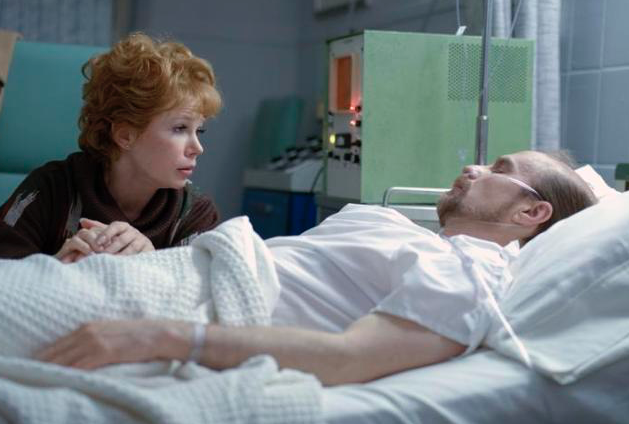 Michelle & Sam as Gwen & Bobby
Michelle & Sam as Gwen & Bobby
Fosse/Verdon wrapped its 8-episode run this Tuesday, and here’s a quick recap on the final three episodes, and some overall thoughts on this captivating mini-series.
Episode Six, “All I Care About is Love”
Episode six concerned Fosse’s heart attack during the editing of Lenny (1974) editing and rehearsals for Chicago on Broadway. It was one of the weaker episodes of the series, especially coming off the previous episode, the almost-staged-play episode with the characters locked in a Hamptons house, arguably the show’s high-water mark. That episode gave director Thomas Kail (who went from Hamilton to TV with graceful ease) the opportunity to put in the nails early on and keep screwing tightly, with all the actors laser-focused on their objectives and obstacles. Episode Six, on the other hand, contained some material handled directly in All That Jazz, and it felt more like a transitional episode for the final narrative haul of the show...
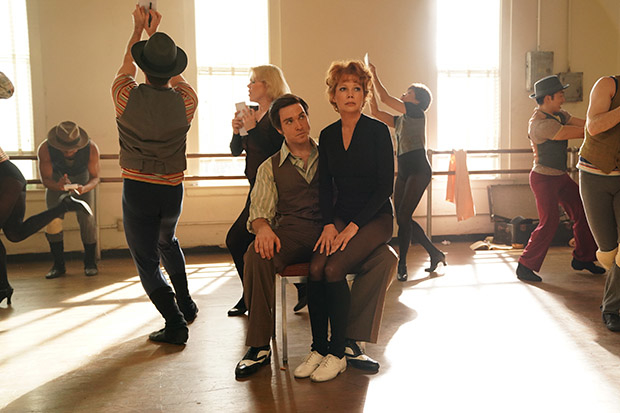 Rehearsal of "We Both Reached for the Gun" from Chicago
Rehearsal of "We Both Reached for the Gun" from Chicago
Episode Seven, “Nowadays”
A vivid reconstruction of the original 1975 production of Chicago, which we see here as Gwen’s passion project, disappointing to her in terms of reviews and the experience. This episode gave us another example of this mini-series' best strengths: displaying how Fosse actually staged something, how he got the inspiration, and how it often worked better than his original (great) idea. When he sees Gwen struggling to dance “We Both Reached for the Gun,” he restages it with her not as a upright puppet but sitting as a ventriloquist’s dummy. It’s a breathtaking sequence, as the entire scene is loaded: we see not only Fosse’s ingenuity but his cruelty. We see Gwen begin to eye the end of her dancing career. Sam Rockwell also plays the Chicago scenes with a sense of disdain: his heart never seems fully in it, and Rockwell nails just the right amount of distance in these scenes. The framing device with Gwen as an “emcee” of sorts wasn't necessary and doesn’t add much texture but at least this show takes risks.
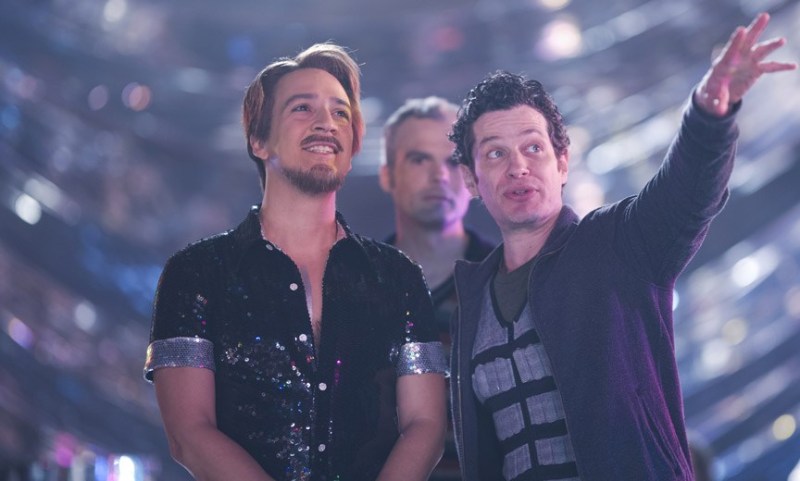 Lin-Manuel Miranda makes a surprise cameo as Roy Scheider in "All That Jazz"
Lin-Manuel Miranda makes a surprise cameo as Roy Scheider in "All That Jazz"
Episode Eight, "Providence"
With the finale, director Kail finds a steady pulse of sadness without ever going maudlin. Fosse, Verdon, and daughter Nicole all find themselves alone, addicted, and afraid, handled here with just the right amount of weight. Writer Steven Levenson smartly includes a scene between Fosse and Nicole, where they dance intimately together during a father-daughter discussion, which of course is mimicked beautifully later in All That Jazz itself. When Nicole sees her life thieved from her so ruthlessly, she realizes the cost of losing something private. There’s a wonderful scene between Rockwell and Williams when the Broadway revival of Sweet Charity is on the table: they know their careers have entered a new phase, one where people want their personas rather than their new ideas. You feel the sadness in that scene because of what you’ve watched for seven episodes: a match that produced some of the most exciting theater of the 20th century.
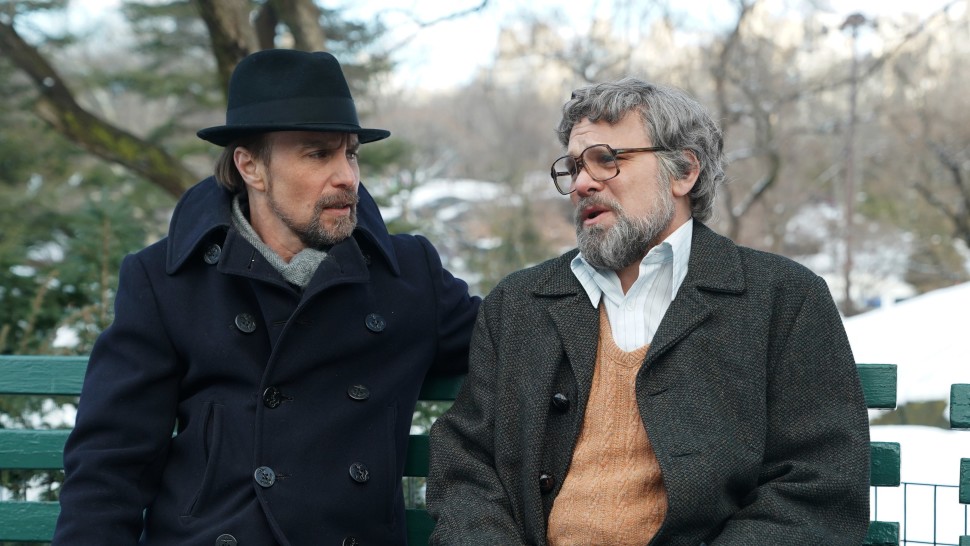 Rockwell and Butz had fine chemistry as Fosse & Chayefsky
Rockwell and Butz had fine chemistry as Fosse & Chayefsky
A quick moment for the supporting players in Fosse/Verdon. These actors had a very difficult task, having to portray real people with very distinct looks and personalities. And while Margaret Qualley and Norbert Leo Butz aren’t natural ringers for Ann Reinking and Paddy Chayefsky, they both burrowed to the basic special qualities of those celebrities: Reinking’s tremulous delicacy and Chayefsky’s brazen harshness. Nobody will ever have that combo of Reinking’s physical power and velvety wobbliness, so Qualley kept it simple and true. She has a fantastic audition sequence here where Fosse viciously corners her into an emotional pit simply to get the role of herself. And Butz was able to make some of the trickier stretches of dialogue (like when Chayefsky “solves” the problem of All That Jazz for Fosse) seem real…you believe that’s how they really talked together. And a special shout out to Jake Lacy, who finds nice layers of his own career disappointment as Gwen’s boyfriend Ron, and to an actress I knew little about, Aya Cash who was glorious as Neil Simon’s first wife Joan.
Sam Rockwell struggled in the early episodes of the show …he didn’t seem to have a handle on the complexities of Fosse. My theory is that he’s never before played a real-life famous person, to whom we have so many cultural references on video. Perhaps he got bogged down in the pressure of that? But starting in episode five, the Hamptons episode, he both relaxed and simultaneously upped his game. He began to nail that Fosse paradox: wonderful enough that he’s worshipped, cruel enough that he’s despised. Rockwell allowed you to see why people would put up with so much from Fosse: when he smiled upon you, you felt like the most special person in the world. He conveyed a sense that Fosse was able to view himself as the victim even in his most selfish moments. And it was joyous to see Rockwell be so physical…his body is right to play a dancer, and his performance fully came together in the second half of the show.
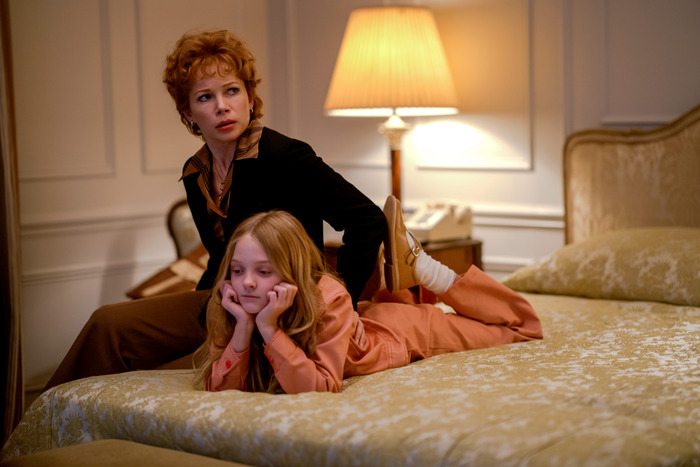
That said, for all the other fantastic acting in Fosse/Verdon, everyone was lapped by Michelle Williams. She just gave the performance of her life in Fosse/Verdon. And it’s up there with the greatest turns by any actress in television, and beyond. The show’s fragmented temporal shifts required Williams to piece together a huge journey sometimes built in very quick, simple moments. Gwen’s arc is calibrated so finely, with such an attention to detail by Williams, that you’re with her every step of the way. There are already articles online detailing William’s incredible voice work as Gwen (a very specific sound well-known to Broadway lovers), and indeed she finds purposeful subtlety in Gwen’s voice (through to the vocal surgery and afterwards) throughout the decades. She also smartly shows us when she’s “on” as “Gwen Verdon” with her voice and approach to people. Nicole Fosse has said in interviews that she loved to be “Gwen Verdon” and loved to be what people expected her to be: and Williams captures the essence of that with every fiber, while subtly showing you the cost of it as well.
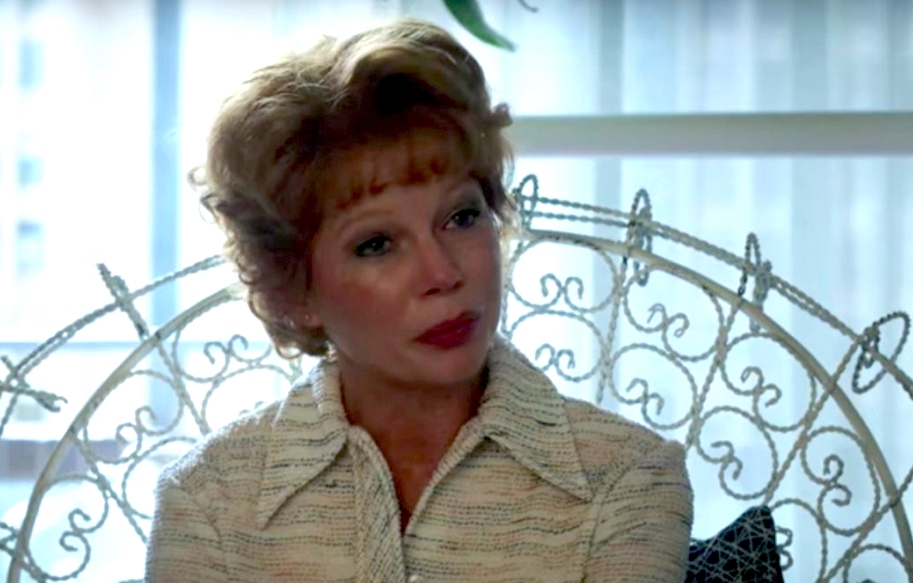
The creative team was also smart to make clear that Gwen Verdon was always was concerned with domestic details, financial worries, and life beyond show business even during her peak as the biggest Broadway star alive. Williams is superb even in the scenes when she’s cooking, folding clothes, etc., because you never for a second doubt that she took care of that whole part of life. Yet Williams captures the “star” part of Gwen Verdon perfectly, too. She creates such a full portrait of Gwen Verdon that it serves as a beautiful tribute to an under-heralded talent by another extraordinary talent. That match, performed at this level of artistry, just soars.
And finally, the entire show doesn’t work if Rockwell and Williams don’t have chemistry, and the show delivered in spades here. Fosse and Verdon shared what was then, and is still now considered an unconventional relationship: they never divorced though each publicly had numerous affairs and relationships, while always staying true to each other. And Rockwell and Williams show you how that could work, and exactly how their relationship transcended definition, and transcended any other relationship in their lives.
Fosse/Verdon had its weaknesses, but love towards this world and these two show business legends was not one of them. It had a few knockout moments, and Michelle Williams will be winning every award out there for the next year if there’s any justice.



Reader Comments (6)
Aya Cash is TERRIFIC in the FXX series "You're the Worst" if you're looking for another fix.
Thanks for writing this up!
Can't wait till this shows in the UK this Summer.
I really liked the series but the last episode felt rushed - like they had the material for two (or more) episodes and had to cram it all into one episode. And for anyone who didn't get the message of Brokeback Mountain, Blue Valentine or, especially, All the Money in the World, this proves beyond a shadow of a doubt that Michelle Williams is at the very tip top of actresses working today. She has her equals. She has no superiors. As for Sam Rockwell never playing a famous person before, one of his first most important roles was playing Chuck Barris in Confessions of a Dangerous Mind, although, admittedly, he didn't really try to imitate him.
Ken S, naturally i considered Confessions, but the whole thing is such a fantasy, and there's no requirement for Rockwell to look or act like Barry. I feel this was a new assignment for Rockwell.
I loved the Nowadays episode more than you Eric. But then I think anytime the show focused on Gwen Verdon it was absolute gold.
I'm less than pleased about how they handled Fosse, and not just in the performance. I felt it was hopelessly reductive to cater to the Me Too movement - casting him as this hopelessly evil casting couch guy so it was good to hear Ann Reinking trying to cast a more complex light on him recently.
You read my mind on the supporting cast. And yes, this work by Williams is breathtaking. Can't wait for her next projects.